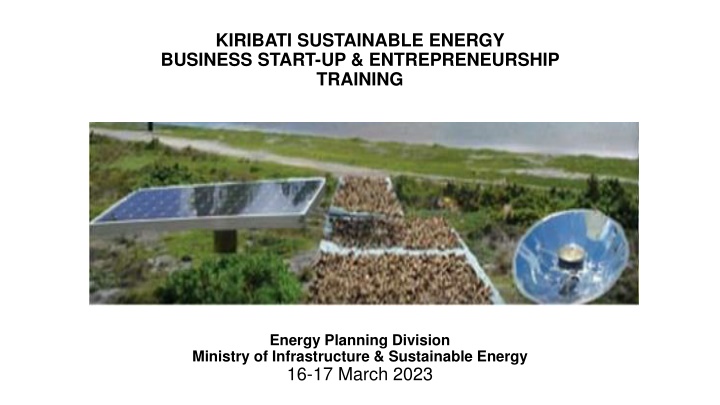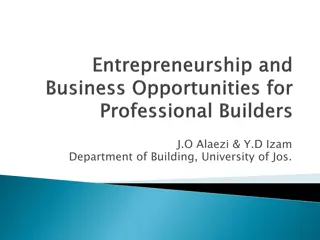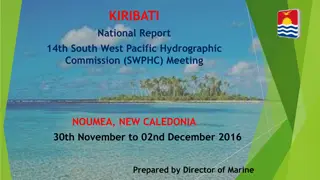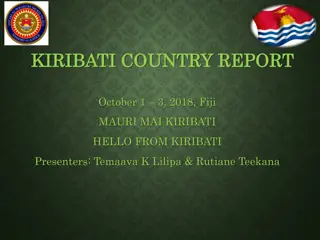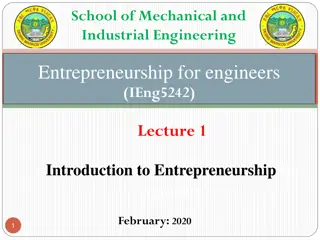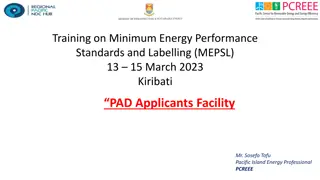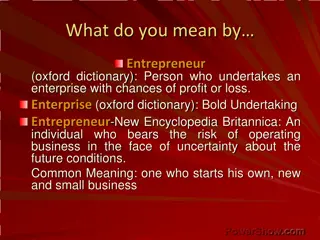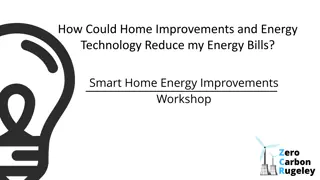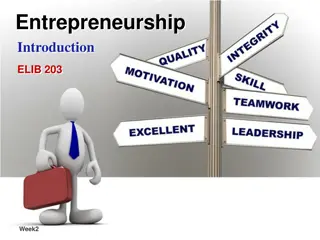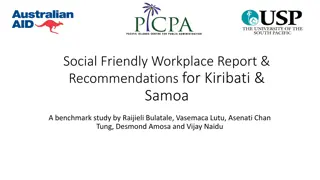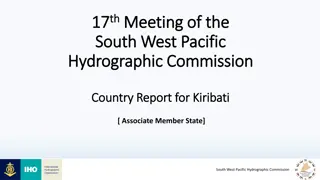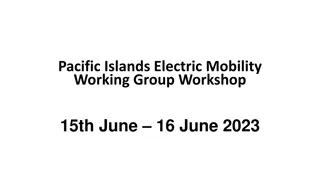KIRIBATI SUSTAINABLE ENERGY BUSINESS START-UP & ENTREPRENEURSHIP TRAINING
This informational content outlines the energy sector overview, policies, frameworks, and the Kiribati Energy Act of 2022. It discusses major benefits and the way forward for sustainable energy development in Kiribati. The presentation covers goals for renewable energy use, legislative developments, and capacity-building initiatives in the energy sector.
Download Presentation

Please find below an Image/Link to download the presentation.
The content on the website is provided AS IS for your information and personal use only. It may not be sold, licensed, or shared on other websites without obtaining consent from the author.If you encounter any issues during the download, it is possible that the publisher has removed the file from their server.
You are allowed to download the files provided on this website for personal or commercial use, subject to the condition that they are used lawfully. All files are the property of their respective owners.
The content on the website is provided AS IS for your information and personal use only. It may not be sold, licensed, or shared on other websites without obtaining consent from the author.
E N D
Presentation Transcript
KIRIBATI SUSTAINABLE ENERGY BUSINESS START-UP & ENTREPRENEURSHIP TRAINING Energy Planning Division Ministry of Infrastructure & Sustainable Energy 16-17 March 2023
Presentation Outline 1. Energy Sector Overview 2. Energy Policies and Frameworks 3. Kiribati Energy Act 2022 4. Major Benefits 5. Way Forward
1. Energy Sector Overview KOIL MISE PUB Energy Planning Division KGES MLPID PRIVATE SECTOR
2. Energy Policies & Frameworks Important Energy Targets: 1. SDG 7 by 2030 2. NDC by 2025 3. Fossil fuel use reduction by 2025 South Tarawa 45% (23% RE, 22% EE) Kiritimati 60% (40% RE, 20% EE) Outer Islands > 60% RE for public infrastructures 100% RE for public and private institutions
3. Kiribati Energy Act 2022 1. Development commenced in 2019 2. Endorsed in Dec 2022 3. Assented in Feb 2023 4. Contents: 12 - Parts Part V Electricity Supply Areas Part VI Electricity Tariffs and Prices Part VII RE&EE Projects and Generation Projects Part X Oversight Inspection Performance Monitoring & Evaluation Part XI Disputes & Consumer Protection 101 - Sections 4 - Schedules Schedule 4 Electricity Regulations
Purposes Modernize the legal and regulatory framework and institutional structure of energy sector Establish a legislative and regulatory environment for private sector participation in the energy sector Establish effective oversight, monitoring and regulatory mechanisms over the energy services and energy service providers Encourage human capacity development both within industry participants and the private sector for implementing and operating sustainable and renewable energy technologies
Part V: Electricity Supply Areas Covers the existing PUB Ordinance (electricity related provisions only) Provides legal frameworks not just for PUB but including MLPID as well Will no longer be exclusive in terms of generation licenses will be issued to generation projects and permits issued to RE projects (Part VII s.34) PUB to set examinations for and issue licenses to electricians will now be conducted and issued by EPD (Part X s.90(4) Compliance, accidents and complaints associated with electrical work or installation will now be investigated by EPD through its Electrical inspectors (Part X s.88)
Part VI: Electricity tariffs and prices Tariff in ESAs will be set by ESA right holders in accordance with rules and a procedure to be developed under the prescribed regulation and reviewed by EPD Tariff for RE projects must be determined and agreed with EPD in accordance with Part VII Tariff for Generation projects must be approved by EPD in accordance with Part VII Lifeline tariff may be applied in cases where the tariff is very high due to price increase
Part VII: RE&EE Projects and Generation Projects Anyone is authorized to: participate in the Electricity sector through RE and generation project installations connect to a network through a Network Code and secondary legislations Functions of RE Government Entity or any private company: must consult and work closely with ESA rights holders (PUB & MLPID) must be guided by EPD where engaged by EPD, may assist in performing RE and EE projects must comply with the Procurement Laws Permit for existing and new RE Projects License for Generation Projects Tariff RE projects: will be agreed with EPD or established by EPD in collaboration with ESA right holder (for solar power and small-generated projects if connected to the grid) Generation projects: will be approved by EPD (s.38) Application Process next slide
Part VII: RE&EE Projects & Generation Projects - Application process EPD to provide a recommendation within 45 days to the Minister as to issue or not issue a permit/license (s.41) If met, then EPD publish a notice as an opportunity to the public to make objections within 28 days (s.42(1)(c)) EPD to consider objections within 14 days and to make final decisions (s.42(2)) Requirement (s.36/39/40) to be met Application submitted Minister (for RE projects) and Cabinet (for generation and existing RE projects) to determine the appeal within 30 days of receipt (s.43) If approved, then the form of permit/license (s.44) containing agreement to accept Terms & Conditions (s.45) must be signed by the permit holder or licensee and Minister If refused, then an applicant may appeal to the Minister within 30 days of the decision made by EPD (s.43) Publication of permits & licenses and amendment issued (s.46-47)
Part VII: RE&EE Projects and Generation Projects - Cont Amendment to permits/licenses can only be done if agreed by both EPD and the holder (s.46(1)) otherwise, a dispute resolution may be invoked (s.46(2)) A license/permit may not be transferred (s.49(1)) subcontracted or delegated to any person (s.49(2))
Part X: Oversight, Inspection, Performance M & E EPD has powers of performance monitoring, inspection, evaluation and performance review, but these are limited to: Inspection, Information and Data Collection, Analysis, Notification, Advice and Reporting Such powers are mainly for enforcement Electrical Inspectors To be proposed by EPD for appointment by the Minister Functions listed under s.88(1) Could be from other Ministries but to be proposed for appointment by the Minister
Part X: Oversight, Inspection, Performance M & E Functions of Electrical Inspectors Ensure compliance with prescribed safety and wiring standards of all energy installations Inspect examine and approve new energy installations before they are connected to a network or commence service or are used for supply to any consumer Inspect and approve RE projects and generation projects Conduct investigations of electrical accidents Investigate consumer complaints and the subject of disputes
Part X: Oversight, Inspection, Performance M & E Powers of Electrical Inspectors enter any place, building or vessel in which there is an energy installation each industry participant, electrical worker, consumer and owner or occupier or person in charge of a place, has a duty to facilitate the entry of, and performance of functions by, an Inspector serve an order upon any industry participant, electrical worker, consumer, or owner or occupier or person in charge of a place, requiring such person to comply with any specified section or rule for compliance An order may require an energy installation to cease nor operated. Any person who, continues to use or operate any energy installation in breach of an order, commits an offence and is liable to a fine prescribed by regulations.
Part X: Oversight, Inspection, Performance M & E - Cont Electrical Code of Practice Sets forth the minimum standards of performance which the service provider has to follow when carrying out its operations To be developed by EPD in collaboration with the ESA rights holders and to consider matters under s.90(3) To be followed at all times by Electrical Inspectors, industry participant, consumers and electrical workers Issue or amendment will be approved by the Minister Electrical workers or authorized workers Must be registered and undertake electrical work within the electrical worker s field of competency Must reports to the Electrical Inspector (through his superior or employer within 3 days) for investigation if he or anyone injured during the work
Part XI: Disputes & Consumer Protection EPD (with OAG s assistance) has authority to assist in resolving disputes stated in s.94-95 Procedure to lodge complaint: Electricity consumer to supplier or vice versa (next step if not satisfied/resolved) Electricity consumer/suppliers to EPD (next step if still cannot be resolved) EPD s final decision to any party (Court) EPD to keep accurate records of complaints/disputes and proceedings (s.96(2)(c)) and to report annually to the Minister (s.96(3))
Schedule 4 - Regulations Network Code that covers, standards applicable to the operation and maintenance of each Network, rights to connect, and rules and conditions for connection to, and use of a network of RE projects and generation projects Net-Metering Regulations - contain rules for the netting and conveyance of excess electricity produced by solar power systems that wish to connect to a network, Standards applicable to the design, permitting, construction, operation and maintenance of RE projectsAny other matters required or necessary for the carrying out, performance and enforcements of the EPLT regulation Standards of service and quality of supply, including for domestic user connections and reconnections Electrical Code of Practice
4. Major Benefits of Energy Act Providing EPD with legal mandate to coordinate, improve sector performance and promote EE Improving utility practice by ESA rights holders through regulations and codes that set standards Providing MLPID with legal framework regarding its electricity Providing transparency in setting tariff and prices Encouraging and cooperation with private sector for participation in the energy sector Achieving national, regional and global RE and EE targets through the private sector participation in the energy sector and through EE initiatives
5. Way Forward Development of regulations stated in Schedule 4 Development of application forms for licensing and permitting Capacity buildings and trainings Awareness programs Enforcement
Acknowledgement NDC-Hup and SPC PCREEE Government Ministries and SOEs Private sector representatives
